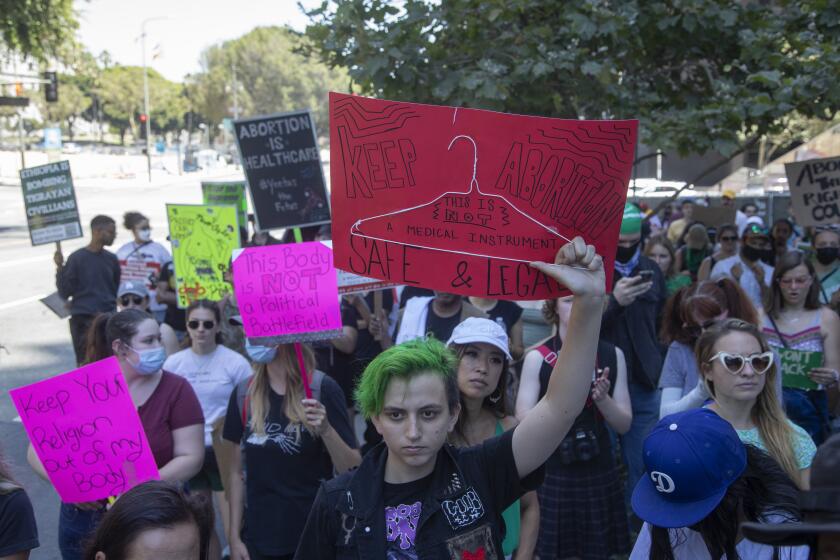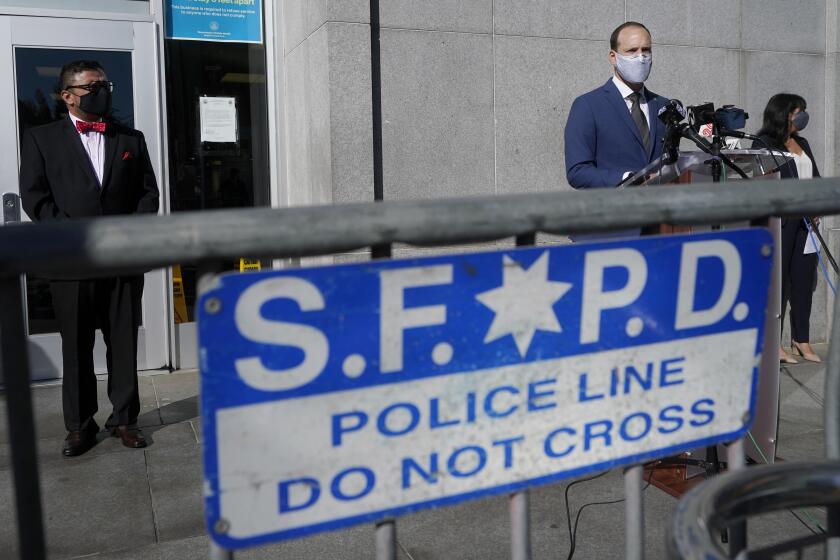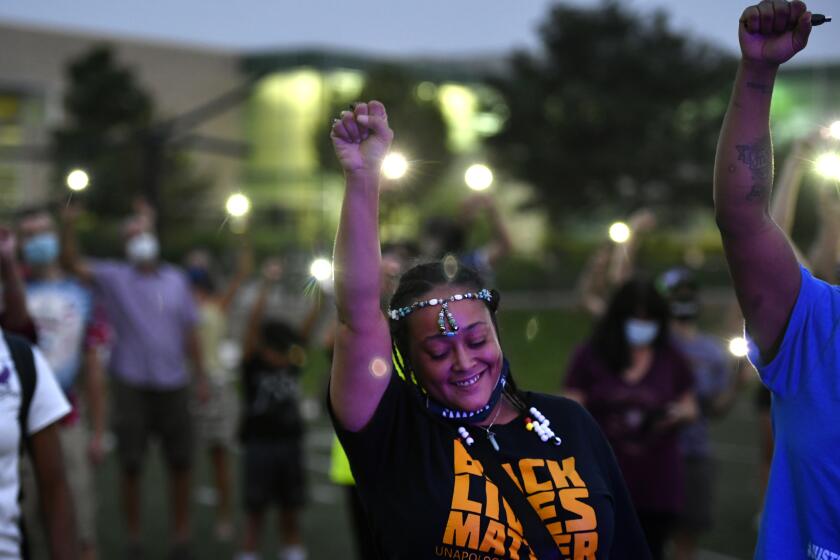Abortion rights protester sues San Francisco, saying paramedic sedated her without consent

- Share via
SAN FRANCISCO — A protester has filed a federal lawsuit against the city of San Francisco, alleging that a paramedic, under police direction, injected her with a sedative while she was handcuffed after being removed from a Golden State Warriors game for demonstrating in favor of abortion rights.
Kareim McKnight and a friend, Amanda Piasecki, were at Game 5 of the Warriors’ championship series against the Boston Celtics at Chase Center on June 13 when they walked onto the main floor and displayed a banner that read: “Overturn Roe? Hell No!” A draft of the Supreme Court’s decision to overturn Roe vs. Wade had been leaked in May.
Video shared by McKnight’s attorney, John Burris, who filed the lawsuit this week, showed security guards dragging McKnight and Piasecki by their feet out of the venue.
McKnight said that once they were outside, a San Francisco police sergeant threatened to have her sedated.
She said San Francisco Fire Department employees then strapped her to a gurney and wheeled her toward an emergency vehicle.
“While I was on the ground, handcuffed in front of the emergency vehicle, one of the firefighters came with a needle towards me, and I couldn’t believe what I was seeing. And I flinched, and I said, ‘No! What if I’m allergic? You can’t just inject me,’” she said.
The protest was organized by the Southern California chapter of Rise Up 4 Abortion Rights, which also helped coordinate a march in the Belmont Shore area of Long Beach.
McKnight said the paramedic didn’t ask her any medical questions and wouldn’t tell her what she was injected with. She said she felt dizzy and began slurring her words.
“Giving an injection to a protester against her will is shocking and illegal,” Burris said, adding that officials violated McKnight’s 4th Amendment right to control her own body.
She was taken for observation to a Kaiser Permanente hospital, which gave her a document showing that she was given 5 milligrams of a drug called Versed, a sedative often prescribed to reduce anxiety. McKnight shared a photo of the document with the Associated Press, which also described her as being in “a distressed emotional state after an altercation with SFPD.”
McKnight said she was not in emotional distress.
3 current, former San Francisco cops charged with destroying evidence, taking gun from property room
The cases stemmed from internal investigations into drugs that were flushed down a toilet and a submachine gun that went missing from SFPD custody.
San Francisco’s policy on dealing with adults “with severe agitation posing a danger to self or others” allows for the use of the drug midazolam, a short-acting sedative sold under the brand name Versed, according to the county’s emergency medical services protocols.
The San Francisco Fire Department wouldn’t say when the county approved the sedative to be used on people being detained or how many times the sedative has been used on detainees. Both the San Francisco Police and Fire Department referred all questions to the city attorney.
Jen Kwart, a spokeswoman for City Attorney David Chiu, said the office couldn’t comment on the lawsuit because it had not yet been served.
The use of sedatives by authorities first got national attention in 2020 when protesters seeking police reform highlighted the death of Elijah McClain, a Black man who was stopped by police in suburban Denver in August 2019. Paramedics were called and injected McClain with the powerful sedative ketamine, but they incorrectly estimated his weight, giving him more than 1.5 times the dose he should have received.
A year after Elijah McClain was stopped by police in suburban Denver, people are celebrating his life as well as calling for justice over his death.
McClain, 23, suffered cardiac arrest, and was later declared brain dead and taken off life support.
A 2020 analysis by the AP of policies on the use of ketamine and cases when the drug was used during police encounters uncovered a lack of police training, conflicting medical standards and nonexistent protocols that have resulted in hospitalizations and deaths.
The review found no federal standards for law-enforcement or emergency medical personnel on the drug’s use. State policies and reporting requirements vary, so it was not clear how regularly it’s used during police encounters and why.
Burris said that in his more than four decades as an attorney, he had never heard of authorities sedating a fully restrained protester.
“The worst part of giving her the injection was that she was strapped to a gurney, handcuffed, and therefore was not a danger to herself or anyone else,” he said.
More to Read
Sign up for Essential California
The most important California stories and recommendations in your inbox every morning.
You may occasionally receive promotional content from the Los Angeles Times.
















